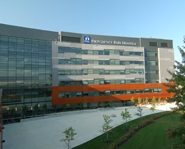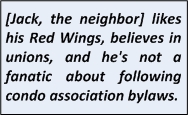

|
 |
Doing What Jesus Would Do?
|
Please go to the new Coffee Coaster site implemented more gracefully in Wordpress. This page: http://brianrwright.com/CoffeeCoasterBlog/?p=2750 |
 It occurred to me the other day, after visiting a neighbor who was hospitalized, that I may have acquired a certain penchant for this sort of modest gesture. Further, many seem to consider a willingness to visit the sick—especially those who are not good friends or kin—a hallmark of high moral sensitivity. Reading the Bible, Matthew 25:36,
Jesus says, "Naked, and ye clothed me: I was sick, and ye visited me: I was in prison, and ye came unto me." Which I remember from Sunday School many years ago.
Well, I don't take any self-satisfaction in doing what comes so naturally, but I am here to report that extending
brief companionship and kind words to the less-familial bedridden does produce deep satisfaction. Nor is it selfless.
It occurred to me the other day, after visiting a neighbor who was hospitalized, that I may have acquired a certain penchant for this sort of modest gesture. Further, many seem to consider a willingness to visit the sick—especially those who are not good friends or kin—a hallmark of high moral sensitivity. Reading the Bible, Matthew 25:36,
Jesus says, "Naked, and ye clothed me: I was sick, and ye visited me: I was in prison, and ye came unto me." Which I remember from Sunday School many years ago.
Well, I don't take any self-satisfaction in doing what comes so naturally, but I am here to report that extending
brief companionship and kind words to the less-familial bedridden does produce deep satisfaction. Nor is it selfless.
Jack, the neighbor, is a former Detroit fireman who once owned a bar down river, finally driving a local truck route to bring in some spending cash before retiring completely. Occasionally mistaken for 'redneck hillbilly from way back when,' he is truly more the good ol' boy with a heart of gold. Likes his Red Wings, believes in unions, and he's not a fanatic about following condo association bylaws. We have gotten along for the 5-10 years he's occupied the ranch unit next door mainly because I don't make much of a fuss, myself, over, say, his garage space being crammed with miscellaneous junk and velvet Elvis paintings... and other code trifles. [I did draw the line when his sister from Texas occupied the condo with four large dogs, or was it six? But for the most part we've been 'neighborly.']
 Lately, he's been having health problems, which coincides with my mom, 84, also having health problems, she being dialyzed for polycystic kidney disease (PKD) three times a week. He's always inquired about her—she lives with me in my colonial—and we try to return the favor. He has diabetes and it's taken a bad turn. Roughly five weeks ago, we get the word he's gone to the hospital, and sure enough he went to intensive care, then circulation problems resulted in the need to remove a toe. Yikes! I found out by reaching Jack on his cellphone. [We have a deal that he pays me $20 for Internet access via my cable hookup, and it was the beginning of the month, and we hadn't seen him at all.]
Lately, he's been having health problems, which coincides with my mom, 84, also having health problems, she being dialyzed for polycystic kidney disease (PKD) three times a week. He's always inquired about her—she lives with me in my colonial—and we try to return the favor. He has diabetes and it's taken a bad turn. Roughly five weeks ago, we get the word he's gone to the hospital, and sure enough he went to intensive care, then circulation problems resulted in the need to remove a toe. Yikes! I found out by reaching Jack on his cellphone. [We have a deal that he pays me $20 for Internet access via my cable hookup, and it was the beginning of the month, and we hadn't seen him at all.]
So it's no big deal, one day after our Tuesday mall walk, Mom and I drop by. I've never been to the hospital where he's admitted, Providence Park, also in Novi, Michigan. Big place, not nearly as spiffy as the new Henry Ford Omamacare facility in West Bloomfield, but new. A sign of the times, nothing is ever as formal as it used to be; most health care places these days, you can go directly to the patient's room like a motel. Visitor's hours have gone the way of dressing up on airplanes. Jack is there and sitting up, he does have some family in the area, including a grandson, and they've been by to visit. He seems okay, undoubtedly the pain killers are kicking in. Doesn't know his status, whether more surgery is scheduled, when he'll be released, etc.
This leads to some thoughts along the lines I've already expanded about in Omamacare II for the Henry Ford Healthcare System. I.e. the main problems with HFHS (and probably other systems which are worse) are:
So I can't say right off the bat that Providence is coming up short like Henry Ford. Besides as I stated in the Omamacare column, I have a lot of respect for the efforts of HF. Who really knows about Jack's place? Providence probably has the same continuity and communications problems—Jack did say he was clueless on the plans for him. The saddest feature of Providence seems to be its vastness; it's a totally modern structure but large and sterile looking. Maybe they're working on some better wall hangings.
Back to the charitable function: just the act of showing up, making the effort to find out how Jack is doing, asking a few questions of the nurses, all this is sort of a Zen thing. Like being part of the grand procession of life. Eckhart Tolle (who certainly got it from someone) uses the phrase 'die before you die'... or in this case 'being with sickness before being with sickness.' The Law of Impermanence states we must all have pain and sickness sometimes, death eventually: it's part of the Grand Cycle. Looking after others who are now under the weather or under the knife is a way of connecting to the universe. It has the effect of making me still inside.
Yes, I believe there's a universal truth in Jesus' words, in performing random and not-so-random acts of kindness.
Final thought: a possible no-cost major innovation in health care: Consider the fact that many infirm and elderly have no one to look after them, basically no one to visit them when they're sick or simply to share common niceties, talk with them about what they find interesting. There are two functions I see: a) advocacy, taking the lead on being the interface to the many systems set up by the government, corporations, or community to provide care, particularly medical care, and b) companionship. A lot of young people have time and could stand to learn about the various complex systems we've accrued. Let's create a volunteer corps of young advocates and companions, let them spread out and meet the loneliness and practical help needs of millions.
All right, so some details need to be worked out. ("Let's set the sea on fire, you work out the details.") How many times have you seen some old man or old woman wandering about in a public place without anyone with them? It's just so sad. Many times their children have died or simply abandoned them. Perhaps I'm just being sentimental. I see my mother, who is certainly no longer able to take care of herself, yet she—knock on wood—will have a comfortable set of sunset years thanks to the accident of my being around, and able and willing to support her. We are so fortunate, both of us. I'm just saying for the small effort it takes to reach out to those who are not so lucky as Mom, the psychic and spiritual rewards could be revolutionary.
Plus one solid hug is worth a boatload of medical-care inefficiencies.
###
2011 August 15
Copyright © Brian Wright | The Coffee Coaster™
Health Care | Hospitals | Jesus | Red Wings | Unions | Neighborliness
| Publish Fee: $25 Donation |  |
|||
| |
|
Main | Columns | Movie Reviews | Book Reviews | Articles | Guest |